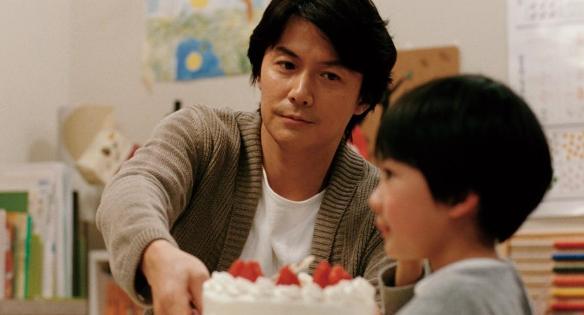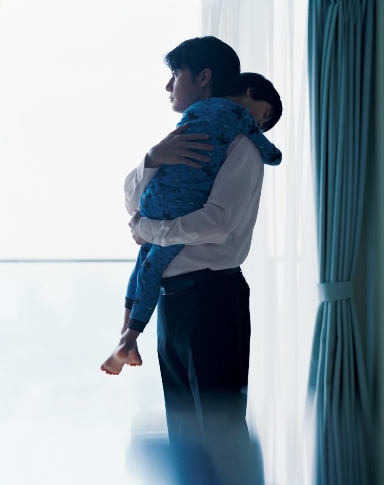Ryota, a Tokyo-based architect, has the air of self-confidence familiar to those who believe they understand precisely how the world works – and how to make it work in one’s favour. He has a comfortable home; Midori, an affectionate (perhaps complaisant?) wife; a disciplined and well mannered (perhaps subdued?) six year old son. Routine, order, self-sacrifice for the greater good; because his engagement with life has served him well, he insists that the same values must be passed on Keita, his six-year-old. The child absorbs the lessons quickly. He applies himself to piano lessons with a diligence that outstrips his talent; during an interview for a place in a selective junior school, he tells the interview board (yes, these things do exist, and father Ryoto clearly approves) that the family went on a camping trip the previous summer. “Why did you say that?” his father questions later, surprised by his son’s subterfuge. “I knew that’s what they would want to hear,” the son replies.

But the world documented so faithfully in the first few minutes of Like Father, Like Son, Hirokazu Kore-eda’s new film, fragments very quickly. The new-school-to-be asks for a blood test (why? Good question), and it transpires that Keita is not Ryoto and Midori’s biological child. There had been a mistake when Keita was born, and he had accidentally been switched with another child. The mistake is tracked back to the hospital where both children were born, and now immediate reparations need to be made. But how does one begin to negotiate such a complicated task: to welcome a strange child into one’s home, and as one’s own, on the one hand; and to revoke, unilaterally, the emotional connection to another?
For good or for bad (it’s probably a bit of both) Hirokazu Kore-eda has a reputation as an accomplished director of “World” cinema, an honorific that supposedly reflects his expertise in teasing out the subtle nuances of his ethnic milieu for the elucidation of the wider world. His films certainly translate well for international audiences, in part because they embrace recurring concern with universal issues of childhood and maturity, albeit set within a very specific Japanese context. Nobody Knows, his elegiac and at times wilfully abstract 2004 film contemplates urban alienation from the perspective of three small children abandoned by their mother; I Wish, from 2011, deals with the painful and all-too-real heartache of family breakdown, when two brothers are separated by their divorcing parents and taken to live in different cities.
Like Father, Like Son, winner of the Jury Prize at this year’s Cannes Film Festival, meanders further along the same path: universal issues enclosed within a very specific and particular social environment. The factors that give meat to the story, we readily recognise: what does the word “parent” mean? How much does social class matter? What counts for more, Nature or Nurture? Or should it be neither? But the context shapes the response of the principals, creating a unique and engaging portrait of what would be for an international audience an unfamiliar, perhaps even a very alien world.
On initial considerations, this tale of two values hews to a sternly bifurcated narrative. The second party to the mix-up are a family that represent everything Ryoto wold want his family not to be. Yudai, the second paterfamilias, is a cheerful underachiever who presides over a benignly chaotic household. He is inclined to feel his way slowly through the quagmire; Ryota, like the hospital responsible for the mix-up, favours an immediate resolution. “It has to be done quickly,” he argues, “It” being the switch that will return the boys to their biological parents. Midori objects: “They are not pets, and you wouldn’t do that to a pet anyway.” But Ryoto’s motivation comes from a deeper source than merely restoring order: “Is it possible to love a child without your blood?” he muses.
The distinctions between the two families thrown together unfold somewhat predictably. Ryoto lives in an elegant high-rise that looks down on the city; Yudai, on the ground, in an untidy house in a modest neighbourhood. Ryoto and family are measured, calculating; Yudai and Co. impulsive and rowdy. Neither of the boys are unhappy in their respective milieus, but the upheaval of exchange has already been telegrammed a long way ahead. In one respect, the questions that the audience might pose seem to be answered very early on. None of this will end well.

But the strength of Like Father, Like Son lies not principally in the storytelling – which, for all its predictability, is competently done – but in the individual characterisation, especially how Kore-eda – who also wrote the screenplay – humanises his cast, avoiding the didactic temptation of turning the film into a zero-sum clash of class and values. Kore-eda pulls from his actors a remarkable, yet thoroughly convincing air of restraint, all the more surprising given the emotive charge of the subject matter. Ryusei and Keita, the two six year olds, inject the right balance of innocence and vulnerability needed to evoke the dilemma thoughtfully. But essentially Like Father, Like Son works because the film nudges us into feeling for Ryoto, and the lonely journey he undertakes to engage with his rigid presumptions about the way his world should work. It doesn’t force us to take sides; it merely reminds us that life is more complicated than we consciously allow.
Like Father, Like Son (2013)
Written and Directed by Hirokazi Kore-eda
Starring Masaharu Fukuyama, Machiko Ono, Yoko Maki
120 mins, Japanese w. English and Hebrew subtitles.





